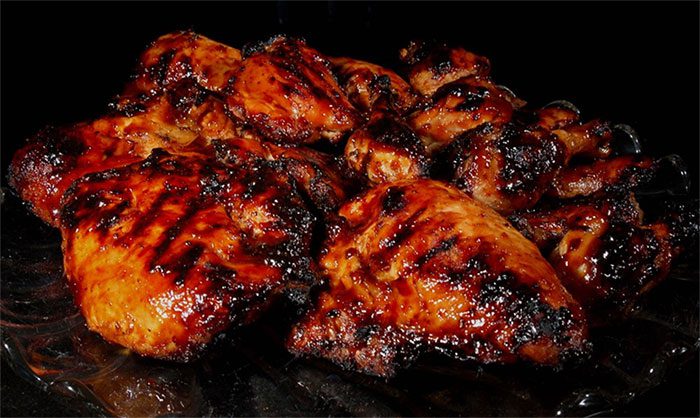The charred parts of grilled meat contain heterocyclic amines and polycyclic aromatic hydrocarbons—substances with a high potential to cause cancer.
Grilled meat is a beloved dish known for its enticing flavors and aromas that few cooking methods can replicate. However, did you know that charred grilled meat can increase cancer risk?
According to Associate Professor Dr. Lam Vinh Nien, Head of the Nutrition and Dietetics Department at Ho Chi Minh City University of Medicine and Pharmacy, heterocyclic amines and polycyclic aromatic hydrocarbons are chemicals that form when meat (beef, pork, fish, poultry) is cooked at high temperatures (fried or grilled) directly over an open flame.
Heterocyclic amines are created when amino acids, sugars, and creatine (substances found in muscle) react under high heat. Polycyclic aromatic hydrocarbons form when fat from the meat comes into direct contact with a hot surface or flame, causing charring and smoke that then adhere to the surface of the meat. In experiments, these substances have the potential to cause genetic mutations, thereby increasing cancer risk.

Using a microwave to cook meat before grilling can help reduce the time of exposure to high temperatures.
In addition to colon cancer, bladder cancer, and kidney cancer, numerous studies have also shown the harmful effects of these substances on the nervous system and male reproductive health when consumed regularly. Specifically, the amount of heterocyclic amines and polycyclic aromatic hydrocarbons in nearly 0.9 kg of charred grilled meat is equivalent to the benzopyrene (a highly carcinogenic substance) found in the smoke of 600 cigarettes.
A study published in the Journal of Nutrition and Cancer confirmed: “Consuming charred grilled meat increases the risk of colorectal cancer by 28% in adults.”
In fact, charred grilled meat is very popular, especially at street food stalls that use charcoal grills. It is common for meat to be grilled for extended periods, resulting in a golden or blackened outer layer.
It is also important to note that sausages and processed meats often contain high levels of nitrites and nitrates. These two substances are used to preserve color and extend shelf life. When grilled at high temperatures, these substances can convert into nitrosamines, a potent carcinogenic compound.
A study published in the journal Cancer Epidemiology, Biomarkers & Prevention showed that consuming grilled processed meats increases the risk of pancreatic cancer by up to 67%.

Grilled meat is a favorite dish for many during winter (Photo: Getty).
Associate Professor Dr. Lam Vinh Nien also mentioned that there are currently no official guidelines regarding the amounts of heterocyclic amines and polycyclic aromatic hydrocarbons in meat. To minimize exposure to these chemicals, the public should pay attention to cooking methods:
- Avoid direct contact of meat with flames or hot metal surfaces.
- Do not extend cooking time (especially at high temperatures).
- Use a microwave to pre-cook meat before grilling to reduce high-temperature exposure time.
- Continuously turn the meat while grilling.
- Trim excess fat from the meat before grilling.
- Remove burnt parts of the meat and do not use the drippings.
- Keep the grill free of grease. If the grill plate is too coated with charred residue from previous grilling, clean it before grilling again to avoid affecting the next cooking.
- Incorporate vegetables: Grilled vegetables do not contain protein, so they do not produce HCAs when grilled. Adding vegetables to your meal can help mitigate risks from grilled meat.
“There is no information on reducing the carcinogenic agents mentioned above by consuming them with other foods. However, some studies suggest that marinating meat (especially with vinegar and garlic) may reduce the risk of forming carcinogenic substances,” Dr. Nien stated.




















































